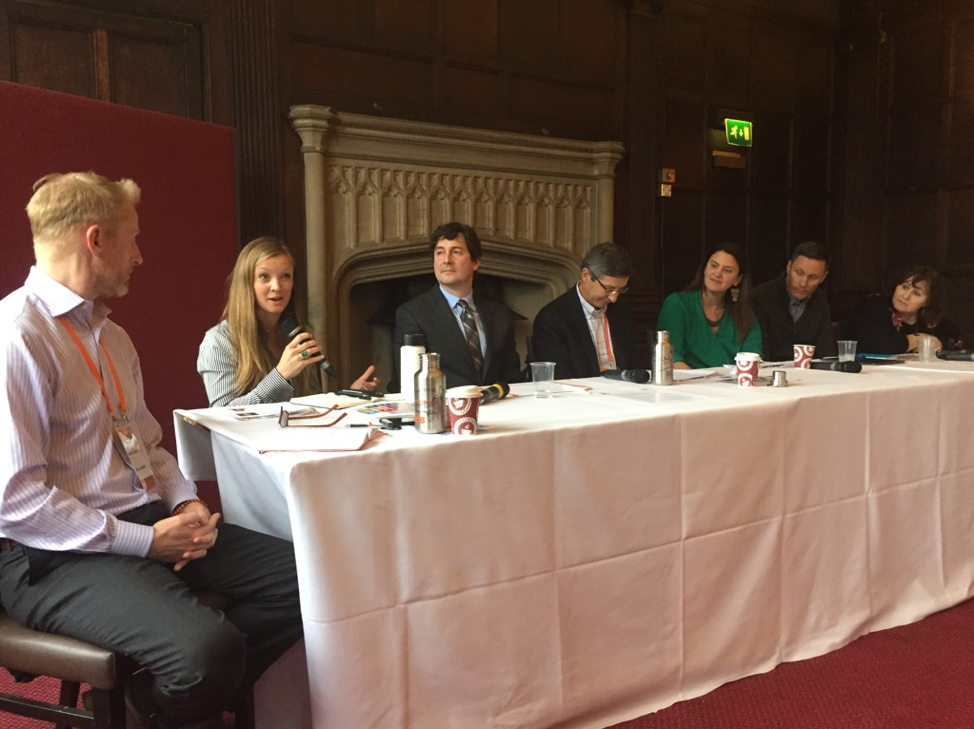In our blog we’ve pulled back the veil on our approach and methodologies through largely ‘plug and play’ resources and Masterclasses so you can skillfully engage the funding partners your mission deserves.
Black Fox Global
Welcome to the Blog
Black Fox Fundraising Handbook
open source download
Each year, nearly a thousand of the world’s most influential social entrepreneurs, key thought leaders, and strategic partners come together for the Skoll World Forum to exchange ideas, solutions, and spark collaboration. Located at the University of Oxford’s Saïd Business School, the Forum is comprised of an extraordinary community of change-makers who are advancing entrepreneurial approaches and solutions to the world’s most pressing problems.
This year’s theme was the “The Power of Proximity” – being proximate to the people and communities we endeavor to help. By more fully grasping people’s needs and dreams through deep interaction, we grow more empathetic, and have a richer understanding of adversities and biases being experienced. Only then can we genuinely understand their journey, earn the privilege to walk beside them, and join them in bringing about change that honors their definition of prosperity.
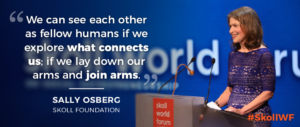
Beloved Skoll Foundation CEO Sally Osberg, put it this way: “Proximity triggers empathy. Social entrepreneurs must commit to proximity to gain knowledge of the contexts affecting the communities they serve and the institutions that can help them scale their solutions.” Sally is stepping down as CEO of Skoll Foundation, but her legacy is a powerful testament to how one woman can unify and propel thousands with her life philosophy and mantra, captured in one word: “Onward!”
Particularly inspiring during the Opening Plenary was a session by Bryan Stevenson, Founder and Executive Director of the Equal Justice Initiative in Montgomery, Alabama. Stevenson is a widely acclaimed public interest lawyer, dedicating his career to helping the poor, incarcerated, and condemned. To understand the Skoll World Forum theme of “The Power of Proximity” – watch his session; it will be the best 20-minute gift you can give yourself today.
In fact, my new addiction is the Skoll Youtube channel, and I encourage you to go there whenever you feel the need to be inspired by the plenary speakers and performers, or to build your professional and/or funder knowledge through the education sessions.
President Jimmy Carter was presented with the annual Skoll Global Treasure Award for his stunning record of achievements in addressing global problems. He shared that having more women politicians will result in a more peaceful world. Carter says it best: “There’s no doubt in my mind that a woman is more inclined to peace than a man is, so I think we can move towards peace if women get more and more positions in parliament and more and more positions as president.” BOOM!
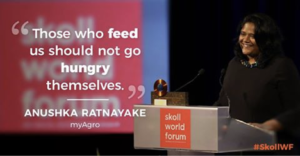
The Skoll Foundation presents the Skoll Awards for Social Entrepreneurship each year to a select group of social entrepreneurs whose innovations have already had significant, proven impact on some of the world’s most pressing problems, and invests directly in the promise of even greater impact at scale.
It’s notable that five out of six Skoll Award winners this year are women – merit-based, certainly, but when I asked Skoll World Forum Co-Founder Stephan Chambers about this over breakfast, he indicated it was “not a coincidence.” Stephan also shared that 60% of this year’s delegates were women, and 65% were people of color. This year’s stellar Awardees are:
Anushka Ratnayake, myAgro
A special congratulations to a Black Fox Global client, myAgro! myAgro is an agricultural focused organization helping farmers through a pioneering microfinancing solution that allows farmers to purchase seeds, equipment and tools they need via a layaway-type plan, eliminating the cycle of scarcity often faced by farmers between harvests.
Jess Ladd, Callisto
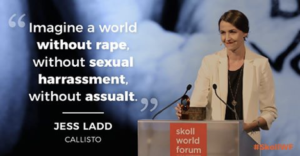
As my personal philanthropic investments center around women and girls, this organization really struck a chord with me (actually it’s “why” made me weep). Callisto is helping women and young girls report sexual assault through software that can keep time-stamped documentation of a sexual assault, searches a database to see if any other women have named the perpetrator, galvanizing the attacked to file a report via the Callisto platform. This has been particularly powerful on college campuses throughout the US.
Lesley Marincola, Angaza
Angaza’s platform enables manufacturers and distributors to make energy products affordable to the world’s 1 billion off-grid consumers.
Jennifer Pahlka, Code for America
Code for America uses the principles and practices of the digital age to improve how government serves the American public, and how the public improves government.
Barbara Pierce Bush, Global Health Corps
GHC’s goal is to recruit a diverse group of young professionals and insert them into existing health and government agencies in an attempt to offer a fresher, more varied view of global health issues.
Harish Hande, SELCO
SELCO provides sustainable energy solutions to the poorest regions of the world through building an ecosystem for accessing clean energy.
Black Fox Global teamed up with Young Presidents Organization to produce a session on the UN’s Sustainable Development Goals titled “From Promise to Practice.” I was inspired to produce the convening by my obsession with the SDGs, and ways in which the Goals are gaining traction in overarching ways: in guiding the deployment of billions of dollars in development finance, in building partnerships between public and private sector actors beyond the 193 UN members who unanimously endorsed them, and in providing a framework for advocacy for each of the seventeen goals.
Yet history teaches us that lasting social change is not gifted from above, but rather through pressure from below. I couldn’t find a central conversation around what that looks like from the boots-on-the-ground perspective in the materials I’d scoured for months, so decided to make the SDGs a central conversation at Skoll among the change-makers themselves. It was thrilling to see that half of the robust attendance were funders, many of whom operate in the “big bet” space.
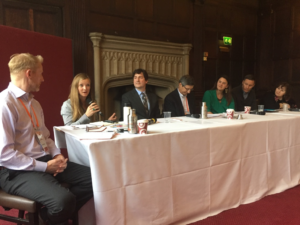 The session included speakers who were curated based upon their leadership in addressing core solutions outlined in the SDGs, their organizations’ impact, and their unique capacity to effectively absorb and deploy bold philanthropy to get the Goals over the finish line by the year 2030. Participants were Sasha Chanoff of RefugePoint; Avery Bang, CEO at Bridges to Prosperity; Martin Fisher, Co-Founder & CEO at Kickstart & Skoll Awardee 2005; Jensine Larsen, Founder & CEO at World Pulse; Eric Stowe, Founder & Executive Director at SPLASH; Leslee Udwin, Founder & President at Think Equal; and moderated by Jay Coen Gilbert of B Lab, Skoll Awardee 2014 (Black Fox Global is proud to be a B Corp!)
The session included speakers who were curated based upon their leadership in addressing core solutions outlined in the SDGs, their organizations’ impact, and their unique capacity to effectively absorb and deploy bold philanthropy to get the Goals over the finish line by the year 2030. Participants were Sasha Chanoff of RefugePoint; Avery Bang, CEO at Bridges to Prosperity; Martin Fisher, Co-Founder & CEO at Kickstart & Skoll Awardee 2005; Jensine Larsen, Founder & CEO at World Pulse; Eric Stowe, Founder & Executive Director at SPLASH; Leslee Udwin, Founder & President at Think Equal; and moderated by Jay Coen Gilbert of B Lab, Skoll Awardee 2014 (Black Fox Global is proud to be a B Corp!)
The smaller gatherings throughout Skoll week were a highlight, and it was incredible to meet with beloved clients, and old and new friends from Women Moving Millions, Opportunity Collaboration, Maverick Collective, The Philanthropy Workshop, as well as serendipitously in the Collaboration Cafe, on the streets of Oxford, and at after-hours parties that are rampant throughout Oxford during the week. The icing on the cake was dining and conversing with social impact giants in the “Harry Potter dining hall” at Christ Church, where in the 19th Century Lewis Carroll, author of Alice in Wonderland, also presided as Lecturer of Mathematics, and where he met the famed 10-year old “Alice”, the daughter of a dean.
I am deeply grateful to be part of a community that cares so deeply about each other, humanity, and the world, and am proud to carry the torch forward into our work at Black Fox Global. Onward!
By Natalie Rekstad, Founder, Black Fox Global
© copyright black fox global 2024
SUBSCRIBE
resources
At Black Fox Global, we’re committed to mobilizing significant resources to help you build capacity, break the cycle of urgency in fundraising, and deepen your impact.
our work
Sign up to receive our collection of our best practices, strategies and insights.
affiliations
Certified b corporation
Black Fox Global is a certified B Corporation. Unlike traditional corporations, Certified B Corporations are legally required to consider the impact of their decisions on their employees, suppliers, community, consumers, and environment.
